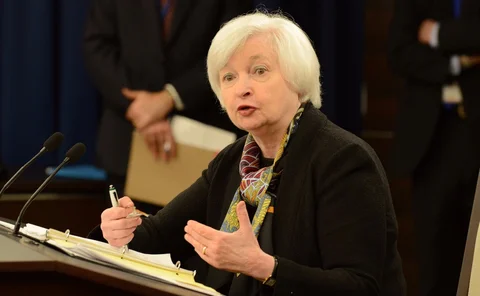Macroeconomics
Flexible working may shift Nairu, ECB’s Mersch warns
Technology may increase insecurity and weaken collective bargaining, says senior ECB figure
BoE’s Broadbent: globalisation has been largely a good thing
Bank of England deputy says flexible labour market has helped dull the pain of adjustment to trade shocks, while lower prices have most benefited the poorest groups
Yellen warns of debt impact on productivity
Fed chair states in “strongest possible terms” that the current spending by the US government is unsustainable and could harm productivity
CEPR paper sketches ‘radical, realistic’ Greek reform plan
Stanford and Yale economists outline “unorthodox” policies that could put Greek debt on a sustainable footing – and might be acceptable to all negotiating parties
Pass-through varies across countries and time – BoE paper
Kristin Forbes and co-authors study the shocks and structural factors that help explain variations in the exchange rate’s impact on inflation
Household balance sheet adjustment a long process – Danish study
Research into patterns of consumption and saving before and after the 2008 crisis shows deleveraging can take a long time; consumption impact of rate hike is “modest”
New Keynesian DGSE models need financial spillover channels – ECB paper
Models without powerful financial spillover channels will be “misleading”- researchers
Survey data can help with modelling expectations – BoJ paper
Discussion paper outlines method of incorporating survey data as a proxy for expectations, with “promising” results for inflation modelling in the US and Japan
No ‘Taylor rule’ without Meltzer’s support
John Taylor says he would “likely have done other things” if not encouraged by Allan Meltzer to develop the eponymous rule
Greek bailout funds approved but debt relief still contentious
IMF agrees “in principle” to new support for Greece, unlocking European funds, but parties still fail to reach accord on debt relief
Norges Bank sees room for improvement when forecasting wages
Evaluation of forecast performance shows both the central bank and other forecasters struggled to produce accurate estimates of wage growth and unemployment
Irish central bank renews Brexit warnings
Rapid house price rise fuelled by scarcity, Central Bank of Ireland says
Term premiums matter for inflation – BoJ paper
Term premiums domestically and abroad appear to affect inflation via the exchange rate channel, authors find
UK election roundup: all eyes on Brexit negotiations
Economists react as UK vote delivers a hung parliament, casting doubt on the way forward with Brexit negotiations and causing a drop in the pound
Obstfeld and Taylor back dual trilemma global finance theory
Economists still need to better incorporate financial stability into their thinking, the authors argue, with the concept of a financial trilemma helping to explain recent instability
Riksbank paper studies impact of oil on world business cycle
Researchers find possible solution to macro puzzles by introducing oil shocks into a model of the global economy
Global institutions strike Mongolia bailout deal
Institutions including the IMF, World Bank and People’s Bank of China strike a deal to provide funding and other support to the slumping economy
IMF’s Werner: Latin America must keep debt under control
Western hemisphere chief says there are some concerning signs on debt, although the risk of a systemic crisis is low; region well placed to weather Fed shock
Zhou highlights need for ‘financial connectivity’ under Belt and Road
Initiative has sizeable financing demands that will require efforts to improve cross-border financial links, PBoC governor says
Dombret asks what form of international economic co-ordination is viable
It is impossible to have full global market liberalisation and national sovereignty and democracy, Bundesbank board member says
Fed report finds many people left behind by growth
Survey finds nearly a quarter of Americans struggling to pay their bills; problems concentrated in less-educated segments of the population and minority groups
French paper looks at impact of budget-neutral fiscal changes
Benefits and costs of budget-neutral changes “not equally distributed across agents”
Industrial goods inflation may be building, ECB says
Prices of goods produced in eurozone see only “subdued” growth
Considerable slack may remain in eurozone labour market – ECB
Under-utilisation of labour may affect 18% of eurozone labour force, researchers say























